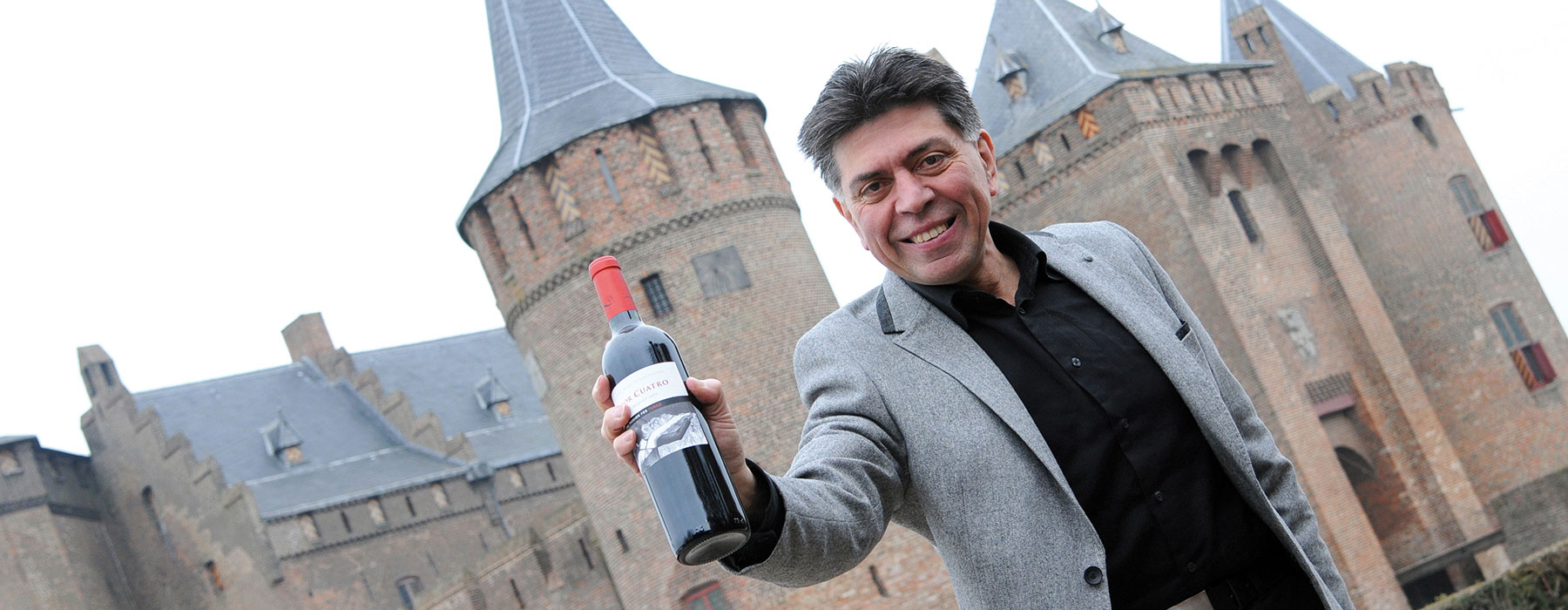NAME: JOSE BELGERETTE
COMPANY: SOLANDES S.A. / WIJNHUIS BELGERETTE
IN THE NETHERLANDS SINCE: 1980
Argentinian Jose Belgerette’s technical training was not recognised in The Netherlands. He therefore worked as a computer operator to make a living, but his heart wasn’t really in it. Many of his compatriots had started an Argentinian restaurant here, so he was conscious of wanting to do something completely different. He found a gap in the market: Argentinian wine. He decided to start as an importer/distributor, while looking for that special wine that would differentiate his business. When he discovered that substances were added to wine to increase its shelf life he decided to start producing his own wine, according to organic principles. Motivated in part by respect for nature he bought a vineyard in Argentina together with two friends, and converted it to the production of organic wines. With the production process now under his control, Jose could introduce a purely Argentinian product to the market – one that is appreciated by both Dutch and European wine lovers.
1. How long have you been in The Netherlands?
Since 1980. I had already visited The Netherlands once and had fallen in love with a Dutch woman. After a bit of travelling we got married and settled permanently in The Netherlands.
2. How did you become an entrepreneur and why?
I had undergone technical training in Argentina, but it wasn’t recognised here. I decided to start working as a computer operator, but that didn’t really suit me. Just as I was about to resign from that job I met a number of Argentinians, in the course of a single week, who all wanted to start an Argentinian restaurant. I thought, ‘If everyone is going to do that then that’s exactly what I shouldn’t do.’ But I was eager to put an Argentinian product on the market and went looking for a market gap. This proved to be Argentinian wine, which was not yet available in Europe. I found suitable vineyards and wineries in Argentina. I’ll never forget the moment that the first container of 13,250 bottles of wine entered the port of Rotterdam. At that time Australian and South African wines sold well, but as a result were mass-produced for supermarkets – at the expense of quality. I wanted to avoid this happening to my wines and made a conscious decision to differentiate my product from the rest. I went again to Argentina and read a wine logbook on regular grape cultivation and wine making. From this it appeared that certain substances were added to the wine so it would keep longer. I absolutely did not want to produce wine in this way and decided to specialise in organic wines. Together with two friends I bought a vineyard, converted it to organic production and built the bodega, Solandes SA, in the middle of it. With limited production, deterioration is also limited and it’s not necessary to use all those additives. Our wine is certified organic in Argentina and in Europe, according to international organic requirements.
I now control the wine production and supply a pure product, which is appreciated by my clients. I have achieved my goal: I’ve specialised, and I have brought a bit of Argentina to The Netherlands that can also be enjoyed by the rest of Europe. I also organise wine tastings for companies and groups of individuals at The Wine Cellar, my premises in Amsterdam, where everyone is welcome for a glass of wine and the information that goes with it.
3. Did you encounter problems when you wanted to become an entrepreneur?
Actually, no. The Netherlands is a country of opportunities: here anyone can become an entrepreneur.
I have also never felt discriminated against. As a foreigner you must ensure that you contribute something, rather than feeling that you’re shut out.
4. What are the differences between doing business in The Netherlands and in Argentina?
In The Netherlands everything is well organised. If you want to start a business you can get a loan (although perhaps a limited one) as well as counselling. In Argentina you can’t start anything without capital. Things are also well organised here when it comes to training and education.
5. What is typically Dutch when it comes to doing business and being an entrepreneur?
What really strikes me is that the Dutch copy each other a lot. If sandwiches with salad (broodje gezond) are the trend, everyone starts a sandwich shop. Argentinians are much more adventurous. I’m convinced that one should do precisely what others aren’t doing. The Dutch don’t always give you an honest opinion. If I don’t like the food or wine in a restaurant I say so. It gives people the opportunity to improve their products. The Dutch prefer to keep silent and just don’t come back a second time.
6. What have you taken from both the Argentinian and Dutch cultures?
From Argentinian culture: ‘living in the now’ – and enjoying every moment.
From Dutch culture: structure, listening well to each other, planning and reacting to developments in the market.
7. Would you ever go back to Argentina?
No, my whole family is here and I’m also doing very well here. I go to Argentina a couple of times a year and that’s enough for me.
8. What are the secrets of your success?
Believe in your product!
9. What is your favourite fruit, and why?
A cold orange on a hot day, tasty and thirst quenching!
10. What is your favourite Dutch product and/or place?
I like the old Dutch villages very much, but I don’t have a favourite Dutch product.
TIPS from Jose
1. Nothing is impossible
2. Know your market
